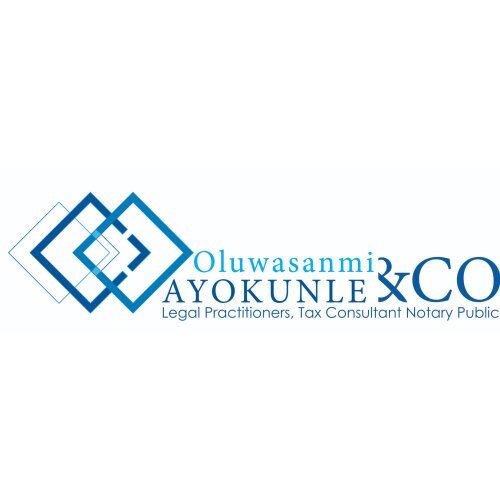Best Faith-Based Law Lawyers in Ikeja
Share your needs with us, get contacted by law firms.
Free. Takes 2 min.
List of the best lawyers in Ikeja, Nigeria
About Faith-Based Law in Ikeja, Nigeria
Faith-Based Law in Ikeja, Nigeria, involves the integration of religious principles, particularly those from Christianity and Islam, with legal frameworks to guide the resolution of disputes and the conduct of various legal matters. Ikeja, being the capital of Lagos State, is a cultural and religious melting pot, and faith-based legal practices reflect this diversity. These forms of law are applied alongside secular Nigerian law to cater to the needs of various religious communities, facilitating marriages, inheritance disputes, and communal conflicts in a manner aligned with religious beliefs.
Why You May Need a Lawyer
There are numerous situations where someone in Ikeja might require legal expertise in Faith-Based Law. These include:
- Family disputes that involve marriage or divorce under Christian or Islamic rites.
- Inheritance issues where Islamic or Christian principles conflict with state laws.
- Business disputes among parties entering into agreements based on shared religious doctrines.
- Resolution of conflicts within religious communities.
- Understanding one's religious rights and obligations in a predominantly secular legal environment.
In all these situations, a lawyer can help you navigate the complexities and ensure your rights and interests are protected under both faith-based and secular legal systems.
Local Laws Overview
Several key aspects of local laws are crucial to Faith-Based Law in Ikeja, Nigeria:
- Marriage and Divorce: Both Islamic and Christian marriages are recognized, but they come with different legal implications concerning polygamy, divorce proceedings, and inheritance.
- Inheritance Laws: Inheritance under Islamic law (Sharia) often diverges from statutory laws, particularly concerning the distribution of estates.
- Dispute Resolution: Many communities prefer settling disputes through mediation and arbitration guided by religious leaders, providing an alternative to the formal court system.
- Religious Rights: The constitution provides for freedom of religion, which affects how faith-based laws coexist with secular laws.
Frequently Asked Questions
1. What is Faith-Based Law?
Faith-Based Law refers to a legal framework that incorporates religious principles into standard legal processes, addressing matters such as marriage, inheritance, and personal disputes within the context of a religious doctrine.
2. Is Faith-Based Law recognized in Ikeja, Nigeria?
Yes, faith-based laws are recognized alongside secular laws in Ikeja. They often apply in matters where parties choose to follow religious tenets, notably in personal and family law.
3. How does Faith-Based Law affect marriage and divorce?
Faith-Based Law can dictate the form of marriage ceremony, the rights and duties within marriage, conditions for divorce, and subsequent rights post-divorce, as determined by religious scriptures and doctrines.
4. Can Faith-Based Law override Nigerian statutory law?
Faith-Based Law does not override statutory law but can be applied concurrently, particularly in personal law matters, unless it contradicts public policy or constitutional rights.
5. What are the implications for inheritance under Faith-Based Law?
Inheritance rules can vary greatly between religions. Islamic law, for example, prescribes specific portions for heirs, which may differ from statutory entitlements under Nigerian law.
6. Can a secular court adjudicate a Faith-Based Law issue?
Yes, secular courts can adjudicate issues involving Faith-Based Law; however, they may seek the expertise of religious scholars or leaders to assist in interpreting religious laws accurately.
7. Do I need a lawyer for a faith-based legal issue?
Having a lawyer is advisable, as they can navigate the complexities of both secular and faith-based legal systems to protect your interests effectively.
8. Are there faith-based alternatives to court proceedings?
Yes, mediation and arbitration led by religious leaders are common alternatives to courts for resolving disputes within religious communities.
9. How does one register a faith-based marriage in Ikeja?
Faith-based marriages typically involve a religious ceremony followed by registration either at a Marriage Registry or the respective religious entity to obtain legal recognition.
10. Are children's rights affected under Faith-Based Law?
Children's rights, such as maintenance and education, are usually upheld in faith-based legal proceedings, although interpretations and applications may vary based on the religious context.
Additional Resources
Several resources and organizations can be helpful for those seeking legal assistance in Faith-Based Law in Ikeja:
- Lagos State Ministry of Justice: Offers resources and guidance on legal matters in the state.
- Christian Association of Nigeria (CAN): Provides advice and resolution support for Christian-based legal inquiries.
- Nigerian Supreme Council for Islamic Affairs (NSCIA): Offers guidance on Islamic law and how it interacts with national laws.
- Alternative Dispute Resolution (ADR) Centers: Non-governmental organizations focusing on mediation and arbitration services.
Next Steps
If you need legal assistance in the field of Faith-Based Law, consider the following steps:
- Identify and understand the nature of your legal issue, whether it involves marriage, inheritance, or other matters.
- Consult with a lawyer experienced in Faith-Based Law to evaluate your case and offer tailored advice.
- Consider engaging with local religious authorities for guidance and mediation, as appropriate.
- Gather relevant documents such as marriage certificates, birth certificates, or any previous legal agreements.
- Explore formal dispute resolution avenues if needed, such as the Lagos State judiciary or recognized alternative dispute resolution mechanisms.
Lawzana helps you find the best lawyers and law firms in Ikeja through a curated and pre-screened list of qualified legal professionals. Our platform offers rankings and detailed profiles of attorneys and law firms, allowing you to compare based on practice areas, including Faith-Based Law, experience, and client feedback.
Each profile includes a description of the firm's areas of practice, client reviews, team members and partners, year of establishment, spoken languages, office locations, contact information, social media presence, and any published articles or resources. Most firms on our platform speak English and are experienced in both local and international legal matters.
Get a quote from top-rated law firms in Ikeja, Nigeria — quickly, securely, and without unnecessary hassle.
Disclaimer:
The information provided on this page is for general informational purposes only and does not constitute legal advice. While we strive to ensure the accuracy and relevance of the content, legal information may change over time, and interpretations of the law can vary. You should always consult with a qualified legal professional for advice specific to your situation.
We disclaim all liability for actions taken or not taken based on the content of this page. If you believe any information is incorrect or outdated, please contact us, and we will review and update it where appropriate.











